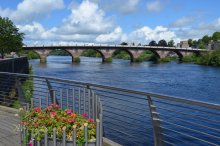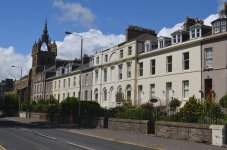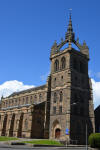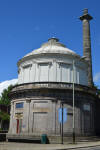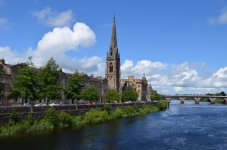Round The World and other travels
A frequent flyer's collection of trip diaries
Spring 2015: Perthshire
The featured destinations on this page were visited on separate occasions during the spring and early summer of 2015.
Dunkeld
 |
 |
 |
 |
 |
 |
 |
 |
Dunkeld is a pleasant small town situated fifteen miles north of Perth, on the banks of the River Tay. Much of the original town was destroyed in the Battle of Dunkeld, fought between Jacobites and Covenanters in 1689. The 18th-century rebuild survives relatively intact today. On a slightly more quirky note, Dunkeld was a favourite holiday destination of English author Beatrix Potter, from the Lake District.
Dunkeld also features a partially ruined former cathedral, which was constructed over a 250-year period starting in the mid-13th century. The bell tower and nave fell into ruin at the time of the Scottish Reformation, and are now in the care of Historic Scotland. The choir and sanctuary, in contrast, survive to the present day as a functioning local parish church in the presbyterian Church of Scotland.
 |
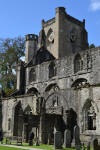 |
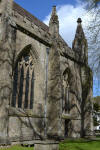 |
 |
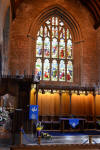 |
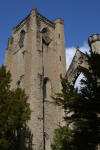 |
 |
 |
Blair Atholl
 |
 |
 |
Blair Atholl is a small village situated seven miles northwest of Pitlochry and approximately 33 miles by road from Perth. Its claim to fame is Blair Castle, ancestral home of the Murray clan, which is headed by the Duke of Atholl. Easily recognised by its striking white appearance, the castle dates from 1269 and sits amid extensive grounds in what would once have been a strategic location on the route from Perth to Inverness. A visit by Queen Victoria in 1844 led to the creation of Europe's only private army, the Atholl Highlanders, which carries out ceremonial duties to this day.
 |
 |
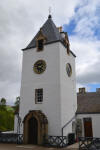 |
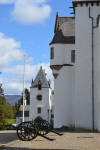 |
 |
 |
 |
 |
 |
 |
||
 |
 |
 |
 |
 |
 |
City of Perth
Perth, situated a little over forty miles north of Edinburgh on the banks of the River Tay, is Scotland's seventh city, having been granted this status in 2012. Or is it? Perth has been popularly called The Fair City ever since Sir Walter Scott wrote The Fair Maid of Perth, but that doesn't mean anything in official circles. Certainly when I went to school, I was taught (and it was widely accepted at the time) that this was Scotland's fifth city, after Edinburgh, Glasgow, Aberdeen and Dundee.
And then something mysterious happened. When Inverness was granted city status in 2000, the Highland capital was proclaimed to be Scotland's fifth city, and when Stirling was similarly elevated two years later, this was publicised as the sixth. What had become of Perth? Opinion seems to be divided: some say that its status was lost in the local government reorganisation of 1974, while others say that the required documentation for city status had never existed in the first place. The occasion of the Queen's Diamond Jubilee provided the perfect opportunity to sort out the mess once and for all.
Present-day Perth has a strong and resilient economy, providing employment and services for a large rural hinterland as well as for local residents. The city is blessed with a modern, showpiece concert hall that should be the envy of many considerably larger settlements. Perth gave its name to the capital of Western Australia, but the Scottish city wasn't always Perth; its ancient name of St John's Toun is still preserved by the city's football club, St Johnstone.




